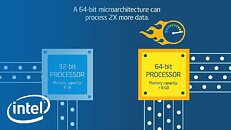- Joined
- Aug 19, 2017
- Messages
- 2,956 (1.06/day)
Intel has announced it will not proceed with X86S, an experimental instruction set architecture that aims to simplify its processor design by removing legacy support for older 32-bit and 16-bit operating modes. The decision comes after gathering feedback from the technology ecosystem on a draft specification that was released for evaluation. The x86, and its 64-bit x86-64 we use today, is a giant cluster of specifications that contains so many instructions rarely anyone can say with precision how many are there. All of this stems from the era of original 8086 processor, which has its own 16-bit instructions. Later on we transitioned to 32, then 64-bit systems with all have brought their own specific instructions. Adding support for processing of vector, matrix, and other data types has increased the ISA specification so much that no one outside a few select engineers at Intel (and AMD) understands in full. From that x86S idea was born to solve the issue of supporting legacy systems and legacy code, and moving on to the x86S ISA, where "S" stands for simplified.
The X86S proposal included several notable modifications, such as eliminating support for rings 1 and 2 in the processor's protection model, removing 16-bit addressing capabilities, and discontinuing legacy interrupt controller support. These changes would have potentially reduced hardware complexity and modernized the platform's architecture. A key feature of the proposed design was a simplified boot process that would have allowed processors to start directly in 64-bit mode, eliminating the current requirement for systems to boot through various legacy modes before reaching 64-bit operation. The architecture also promised improvements in handling modern features like 5-level paging. "Intel will continue to maintain its longstanding commitment to software compatibility," the company stated in the official document on its website, acknowledging that the x86S dream is over.

The company plans to move forward with working closely with industry partners on its x86 Ecosystem Advisory group, which we covered deeply. Today, for Tom's Hardware, Intel spokesperson noted:
View at TechPowerUp Main Site | Source
The X86S proposal included several notable modifications, such as eliminating support for rings 1 and 2 in the processor's protection model, removing 16-bit addressing capabilities, and discontinuing legacy interrupt controller support. These changes would have potentially reduced hardware complexity and modernized the platform's architecture. A key feature of the proposed design was a simplified boot process that would have allowed processors to start directly in 64-bit mode, eliminating the current requirement for systems to boot through various legacy modes before reaching 64-bit operation. The architecture also promised improvements in handling modern features like 5-level paging. "Intel will continue to maintain its longstanding commitment to software compatibility," the company stated in the official document on its website, acknowledging that the x86S dream is over.

The company plans to move forward with working closely with industry partners on its x86 Ecosystem Advisory group, which we covered deeply. Today, for Tom's Hardware, Intel spokesperson noted:
We remain deeply committed to the x86 architecture, as demonstrated by the creation of the x86 Ecosystem Advisory Group in collaboration with AMD and other industry leaders. This initiative reinforces our dedication to securing a strong future for x86, building on decades of software compatibility. While we have pivoted away from the x86S initiative, our focus remains on driving innovation and collaboration within the x86 ecosystem.
View at TechPowerUp Main Site | Source







